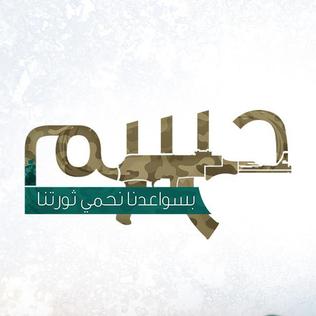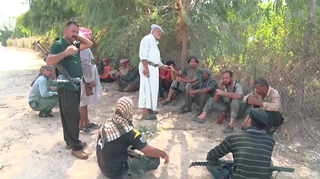Related Research Articles
In Myanmar, terrorism is defined by the country's counter-terrorism law and its subsections, which is interpreted by the Anti-Terrorism Central Committee and enforced by the government of Myanmar. Two groups are currently listed as terrorist organisations in accordance with Myanmar's counter-terrorism law; the Arakan Rohingya Salvation Army (ARSA), which was added on 25 August 2017, The SPDC military government called the Vigorous Burmese Student Warriors (VBSW) "terrorists" after their role in the 1999 Myanmar Embassy siege, but the group was never legally declared as such.

The insurgency in the Maghreb refers to the ongoing Islamist insurgency in the Maghreb region of North Africa that followed on from the end of the Algerian Civil War in 2002. The Algerian militant group Salafist Group for Preaching and Combat (GSPC) allied itself with al-Qaeda to eventually become al-Qaeda in the Islamic Maghreb (AQIM). The Algerian and other Maghreb governments fighting the militants have worked with the United States and the United Kingdom since 2007, when Operation Enduring Freedom – Trans Sahara began.

The South Yemen insurgency is a term used by the Yemeni government to describe the protests and attacks on government forces in southern Yemen, ongoing since 27 April 2009. Although the violence has been blamed on elements within the southern secessionist movement, leaders of the group maintain that their aims of independence are to be achieved through peaceful means, and claim that attacks are from ordinary citizens in response to the government's provocative actions. The insurgency comes amid the Shia insurgency in the country's north as led by the Houthi communities. Southern leaders led a brief, unsuccessful secession in 1994 following unification. Many of them are involved in the present secession movement. Southern separatist insurgents are active mainly in the area of former South Yemen, but also in Ad Dali' Governorate, which was not a part of the independent southern state. They are supported by the United Arab Emirates, even though the UAE is a member of the Saudi Arabian-led coalition working to support the Yemeni government.

The Sinai insurgency was an insurgency in the Sinai Peninsula, Egypt, that was commenced by Islamist militants against Egyptian security forces, which have also included attacks on civilians. The insurgency began during the Egyptian Crisis, during which the longtime Egyptian president Hosni Mubarak was overthrown in the 2011 Egyptian revolution.

Operation al-Shabah was launched in May 2013 by the Iraqi Army, with the stated aim of severing contact between the Islamic State of Iraq and the Levant and the al-Nusra Front in Syria by clearing militants from the border area with Syria and Jordan.
Timeline of the Boko Haram insurgency is the chronology of the Boko Haram insurgency, an ongoing armed conflict between Nigerian Islamist group Boko Haram and the Nigerian government. Boko Haram have carried out many attacks against the military, police and civilians since 2009, mostly in Nigeria. The low-intensity conflict is centred on Borno State. It peaked in the mid 2010s, when Boko Haram extended their insurgency into Cameroon, Chad and Niger.
Soldiers of Egypt or Ajnad Misr is a Salafist Islamist militant group that has been operating near Cairo, Egypt. The group was founded by Humam Muhammed in 2013, after he split away from the Ansar Bait al-Maqdis militant group. The group claims that its attacks are "retribution" for the August 2013 Rabaa Massacre; notably, the group targets only security forces. It has warned civilians of the presence of bombs that it has placed. The Cairo Court for Urgent Matters declared the group a terrorist group on 22 May 2014. It has been a Proscribed Organisation in the United Kingdom under the Terrorism Act 2000 since 28 November 2014. The United States Department of State designated it a terrorist organization on 18 December 2014.

Jaish ul-Adl, or Jaish al-Adl, is a Salafi Islamist militant organization that operates mainly in southeastern Iran, where there is a substantial concentration of Sunni Baluchis and a porous border with Pakistan. The group is responsible for several attacks against civilians and military personnel in Iran. The group claims that it is a separatist group fighting for independence of Sistan and Baluchistan Province and greater rights for Baluch people. Iran believes that the group is linked to Al-Qaeda. The group also maintain ties with Ansar Al-Furqan which is another Iranian Baloch Sunni armed group operating in Iran. Salahuddin Farooqui is the current head of Jaish ul-Adl. His brother, Amir Naroui, was killed by Taliban in Afghanistan.
The following is a chronological timeline of fatal incidents during the ongoing Sinai insurgency, which was invigorated by a period of relative instability and political turmoil in Egypt, beginning with the 2011 uprising against former autocrat Hosni Mubarak. Insurgent attacks, however, intensified significantly following the July 2013 coup that ousted Muslim Brotherhood-backed president Mohamed Morsi and subsequent crackdown on his supporters.

The Islamic State – Sinai Province is a branch of the militant Islamist group Islamic State that is active in the Sinai Peninsula of Egypt.

In July 2013, at the same time as mass protests began against the 3 July coup d'état which deposed Mohamed Morsi, and in parallel with the escalation of the already ongoing jihadist insurgency in the Sinai Peninsula, pro-Muslim Brotherhood militants started violent attacks against policemen and soldiers in Central and Western Egypt. In the following months, new Islamist armed groups were created to reinstate Islamist rule in Egypt, like Soldiers of Egypt and the Popular Resistance Movement. Since 2013, violence in mainland Egypt has escalated and developed into a low-level Islamist insurgency against the Egyptian government.

The Arms of Egypt Movement, commonly known as the Hasm Movement, is an Islamist militant group operating in Egypt.
The Insurgency in Bahrain is an ongoing insurgency by militant groups, supported by Iran, to topple government of Bahrain.

The Islamic State insurgency in Iraq is an ongoing low-intensity insurgency that began in 2017 after the Islamic State (ISIS) lost its territorial control in the War in Iraq, during which ISIS and allied White Flags fought the Iraqi military and allied paramilitary forces.

The Islamic State–Taliban conflict is an ongoing armed conflict between the Islamic State and the Taliban in Afghanistan. The conflict escalated when militants who were affiliated with Islamic State – Khorasan Province killed Abdul Ghani, a senior Taliban commander in Logar province on 2 February 2015. Since then, the Taliban and IS-KP have engaged in clashes over the control of territory, mostly in eastern Afghanistan, but clashes have also occurred between the Taliban and IS-KP cells which are located in the north-west and south-west.

Islamist insurgency in the Sahel or Jihadist Insurgencies in the Sahel refers to the Islamist insurgency in the Sahel region of West Africa following the 2011 Arab Spring to the present day. In particular, the intensive conflict in the three countries of Mali, Niger and Burkina Faso has been referred to as the Sahel War.
References
- ↑ "Ministry: Bomb kills three police in Bahrain". Al Arabiya English. 2014-03-03. Retrieved 2023-06-22.
- ↑ "Bomb blast kills three Bahrain policemen". BBC News. 2014-03-03. Retrieved 2023-06-22.
- ↑ "Bahrain puts groups on terrorism list after bomb kills 3 police". Reuters. 2014-03-04. Retrieved 2023-06-22.
- ↑ "Bahrain puts groups on terrorism list after bomb kills 3 police". Reuters. 2014-03-04. Retrieved 2023-06-22.
- ↑ "Bahrain executes three Shia men over 2014 police killing". BBC News. 2017-01-15. Retrieved 2023-06-22.